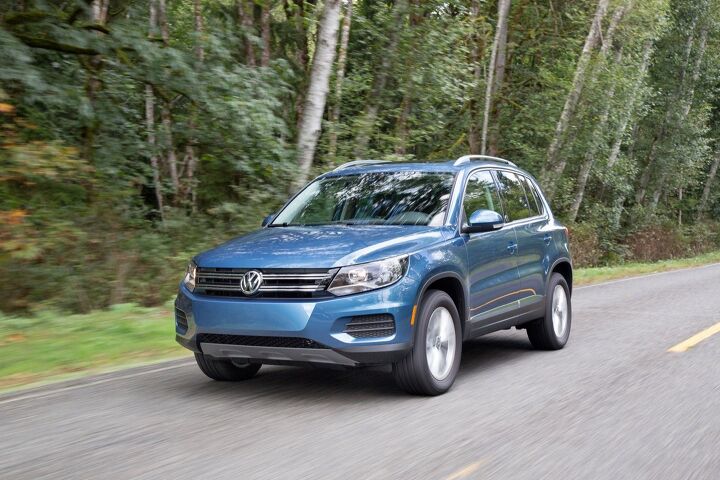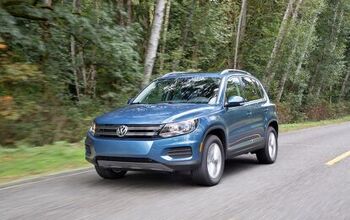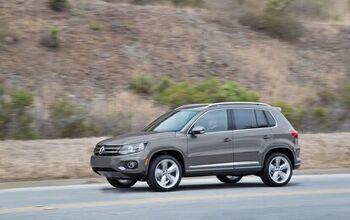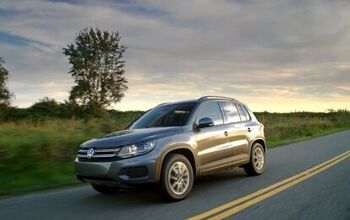Volkswagen Tiguan Limited Will Soon Become Volkswagen Tiguan Unavailable

If you’re in the market for a very small (for its class) German crossover that demands premium fuel, you’ll soon be out of luck. Volkswagen says the Tiguan Limited — the old model kept in production alongside the newer, much larger Tiguan — will not return for the 2019 model year.
Instead, buyers who can’t go without a Tiguan badge on their vehicle will have to come to grips with knowing they’ll need to spend just over two grand more to satisfy their urge. Alas, we all knew it couldn’t last long.
Volkswagen spokesman Mark Gillies confirmed the looming discontinuation to CarsDirect. By offering the old model alongside the new one, VW was able to lure buyers into showrooms with the promise of a lower MSRP. The 2018 Tiguan Limited carries an after-delivery entry price of $23,150; the regular Tiguan, with its 11 extra inches of wheelbase and available (or standard, depending on trim) third-row seat, starts at $25,495.
That’s a smaller price gap then when the next-generation debuted in the middle of last year. It seems VW prepared for the impending loss of its price leader by nudging the models closer together, thus pushing many shoppers in the larger model’s direction.
If leasing is on those shoppers’ minds, they might discover that no price gap exists. As reported earlier this month by CarsDirect, leasing an old Tiguan Limited instead of a new, base Tiguan S might empty your wallet faster. In California at least, leasing a 2018 Tiguan Limited over 36 months works out to $262 per month, after factoring in the due-at-signing payment. A 2018 Tiguan S? $254 per month over the same term.
Blame the newer Tiguan’s higher residual value. For short-term owners, moving up to the far roomier version makes a lot of sense. It’s doubtful many Tiguan buyers would lose much sleep worrying about the 16 extra horses they gave up by choosing the newer model.
Sales of the Tiguan Limited fell 34.5 percent in May, year over year, with volume of the petite two-row crossover falling 49.2 percent over the first five months of 2018. Buyers have already made up their minds. The new Tiguan remains, by a fair margin, the best-selling vehicle in VW’s American stable.
[Images: Volkswagen of America]

More by Steph Willems
Latest Car Reviews
Read moreLatest Product Reviews
Read moreRecent Comments
- Carson D I was thinking that this is such a nice car, and it is a bit of a shame that you use it so little. Then I remembered that I still have a car that I purchased new in 2007 which now has 78,000 miles and is sitting in a parking space I moved it to so my parents could park in its space when they visited about a month ago. That your 2019 Golf Sportwagen had headliner and water intrusion issues is a stark reminder that people who still buy VWs are like those people who still vote for bail reform politicians after they've been assaulted by someone who'd already been arrested for violent acts half a dozen times in two months. I knew two people who bought new Jetta Sportwagens who suffered spooling mesh headliners that became jammed, unfurled and frayed combined with leaking two-plane sunroofs...in 2009! They were also involved in a class action lawsuit about 'mandatory optional' equipment that they paid for that the cars weren't actually equipped with. I think it was Bluetooth links.
- Bd2 Engine problems have been fully remedied, please have no further concerns. All customers are satisfied, check Google and Reddit for further information. Salutations and please have a nice day.
- Wjtinfwb Keep it. A good car you're not tired of is like a great dog. Irreplaceable. After 45 years of car ownership, there's just a few I wish I never sold and realized my total proceeds from selling those few cars was less than 75k dollars. Not a lot of Lexus that you'd say are irreplaceable, but a solid GS is one of them.
- Add Lightness Lots of Eye rolling with the Urus.Less eye rolling with the equally useless (or should I say underutilized) LM002.
- Tim You can't buy Fisker for $27 million. All that buys is the shares, which are basically worthless at this point. To buy the company you have to ante up the $1.3 billion owed to its creditors, otherwise they'll just take it away from you in a few weeks.For all we know the house may also be leveraged to the hilt. That seems to be how this guy rolls.Still, if I had to choose, I'd choose the house. I hate EVs.


































Comments
Join the conversation
I have a 2012 tiguan myself with a 6spd and fwd. it most certainly could use awd as i find it torque steering and loosing traction quite easily. The power is very decent though- my understanding is that it is either the same engine, or very similar engine from the gti, and it does move very decently for what it is. I find myself suprised by the fuel economy in the real world- rated at 27 on the highway, often I see closer to 30 indicated on the computer. Premium fuel is definitely not a lot of fun, but most turbocharged engines are going to have that.
Kudos for one more in a long line of snarky, dismissive reviews of the Tiguan. Only in the last sentence do you concede that this is VWA's best-selling vehicle. That's a rare achievement for a nine-year-old car! Usually, sales peak in the first years and dwindle afterwards. The Tiguan must be meeting somebody's needs, right? Even if you just know they should all have bought Mazdas, or ________ instead. The ur-Tiguan has seen nine years with just one engine and two transmissions, and saw just one styling update. Until someone suggests otherwise, I'd call this VW's most enduring and unchanging car since the Beetle!